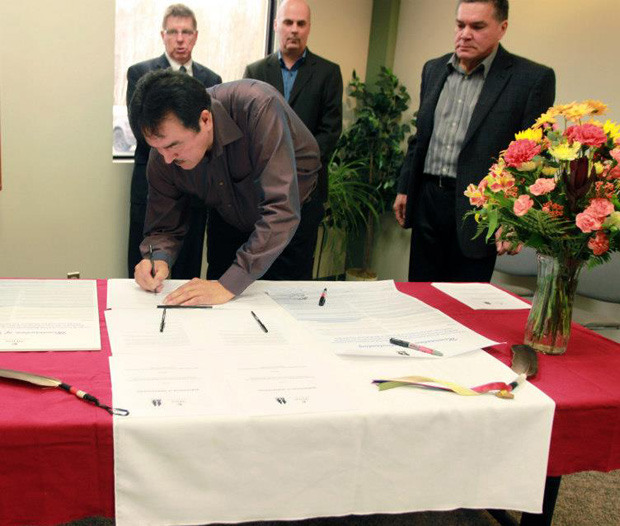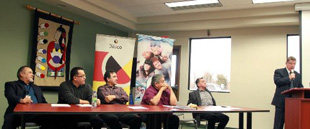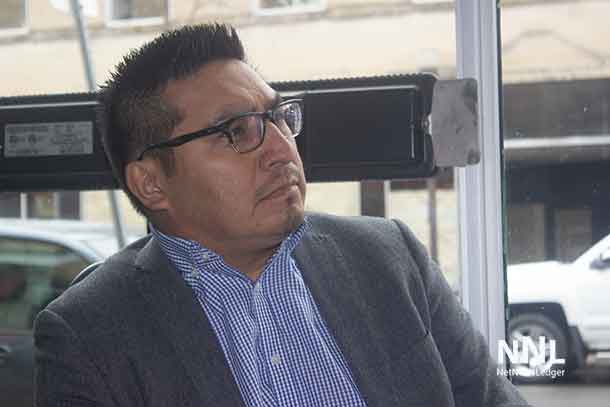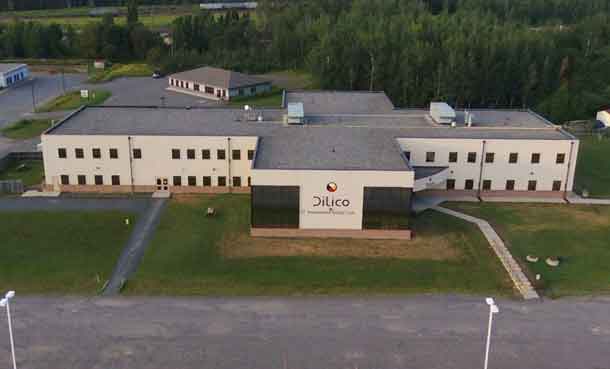

FORT WILLIAM FIRST NATION – Dilico Anishinabek Family Care (Dilico) and the Children’s Aid Society of the District of Thunder Bay have signed a memorandum of understanding to improve child welfare services for Aboriginal children and families. The agreement reached by the parties is designed to recognize the importance of culture and increase the respect level for Aboriginal peoples.
In attendance at today’s ceremony were Union of Ontario Indians Grand Council Chief Patrick Madahbee and Norther Superior Grand Chief Peter Collins.
“Thunder Bay CAS has always been supportive of Dilico and the idea that, whenever possible, Aboriginal children and families should receive child protection services from an Aboriginal child protection agency,” says Richardson. “We see the transfer of jurisdictional authority to Dilico as the next logical step in a transition of services for Aboriginal children and families, with the ultimate step being the application to the Minister to formally change the jurisdiction of the two agencies.”
To date, the two agencies have worked successfully together in the same jurisdictional area but an official jurisdictional transfer has never been formalized.
“The memorandum is really quite significant in that we are solidifying a partnership that allows our First Nations the opportunity to take care of their own children and families,” adds Hardy. “New referrals will come in to Dilico and one of the immediate next steps will be to work together to develop a service agreement so both agencies can operate as efficiently as possible to minimize overlapping of services and explore new possibilities to partner on specific initiatives.”
Union of Ontario Indians Grand Council Chief Patrick Madahbee and Northern Superior Grand Chief Peter Collins were also in attendance to sign the memorandum in support of the agencies’ commitment to move forward with improved service provision in mind. The memorandum is the first of its kind in the province and Chief Madahbee plans to promote the jurisdictional transfer as a model for other children’s aid societies, both Aboriginal and mainstream, throughout the province.
Dilico Ojibway Child and Family Services was incorporated on July 23, 1986 with a mandate to develop and implement a child welfare system to strengthen, maintain and support Anishinabek children and families. “First Nations agencies know how to take care of their children in a culturally-appropriate way,” says Adrienne Pelletier, Union of Ontario Indians Social Services director. “Our agencies are sure to notify band reps in a timely manner when there is a child welfare matter. Customary care – making sure that our children are being looked after by community members or aboriginal families in an urban setting – is important to ensure children still have a connection to culture and language.”
Pelletier says she expects better child welfare outcomes because of the Thunder Bay agreement.
“The Anishinabek Nation has developed a draft Child Welfare Law to take over jurisdiction for all Anishinaabe children – securing jurisdiction on and off reserve is part of that plan of all of our 39 communities,” says Pelletier.
Dilico Executive Director Michael Hardy and Board President Omer Belisle and CAS Executive Director Rob Richardson and CAS Board President David Tranter signed the agreement.
At today’s press conference, one of the areas addressed was on the subject of oxycodine abuse and methadone as a treatment for the addiction.
This issue has been coming to the forefront in recent days with critics of the use of methadone as a treatment is being increasingly viewed as not solving the problem. The First Nations communities are taking leadership in this area, and seeking healing and progress to solve the problems.

Photographs by Lynda J. Henshell







